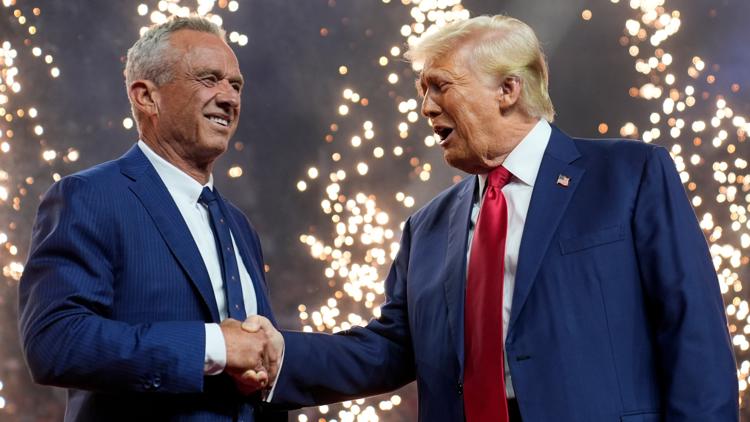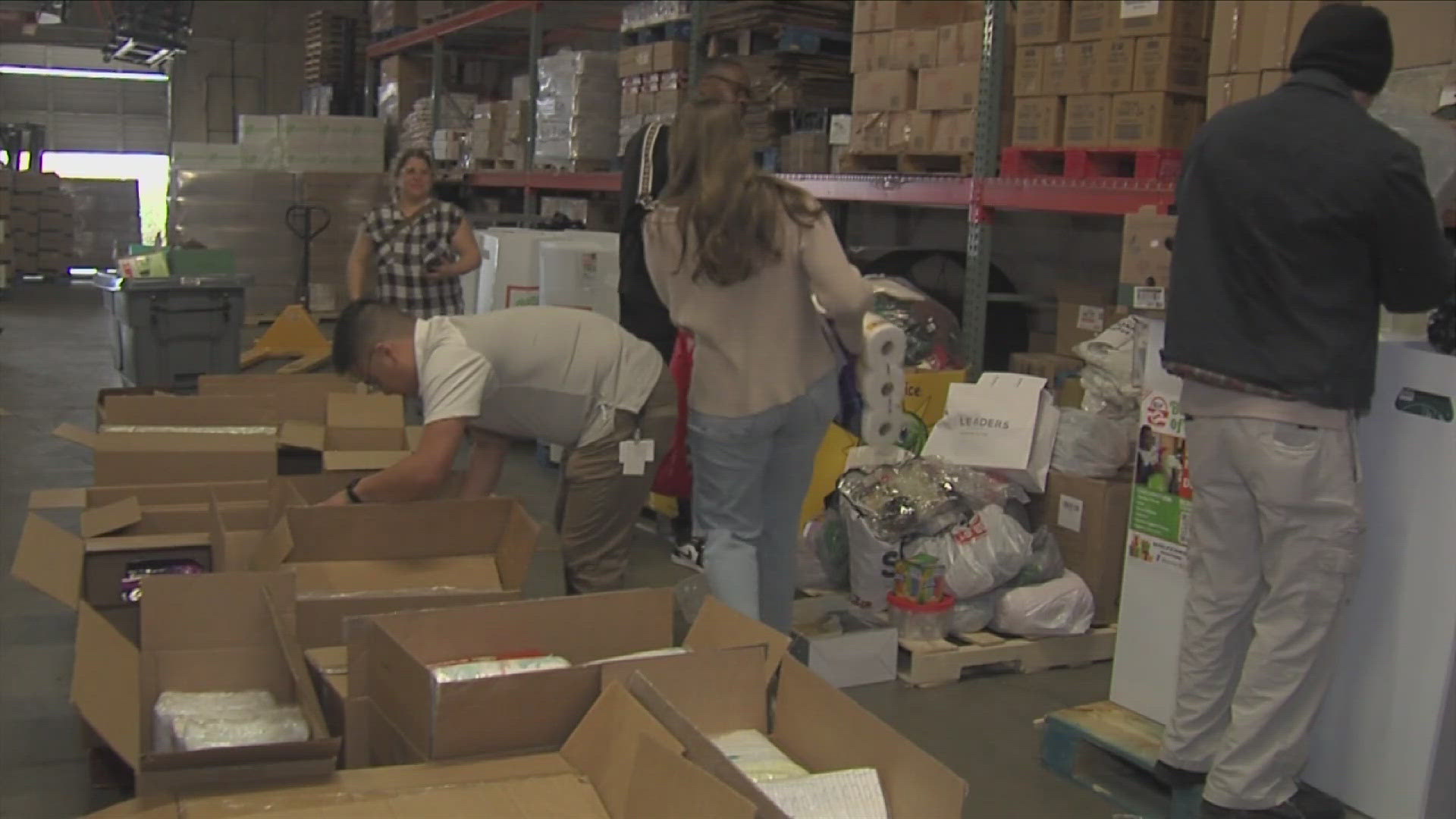PHOENIX — Robert F. Kennedy Jr. suspended his independent campaign for the White House and endorsed Donald Trump on Friday, a late-stage shakeup of the race that could give the former president a modest boost from Kennedy’s supporters.
Hours later, Kennedy joined Trump onstage at an Arizona rally, where the crowd burst into “Bobby!” cheers.
Kennedy said his internal polls had shown that his presence in the race would hurt Trump and help Democratic nominee Kamala Harris, though recent public polls don’t provide a clear indication that he is having an outsize impact on support for either major-party candidate.
Kennedy cited free speech, the war in Ukraine and “a war on our children” as among the reasons he would try to remove his name from the ballot in battleground states.
“These are the principal causes that persuaded me to leave the Democratic Party and run as an independent, and now to throw my support to President Trump,” Kennedy said at his event in Phoenix.
However, he made clear that he wasn’t formally ending his bid and said his supporters could continue to back him in the majority of states where they are unlikely to sway the outcome. Kennedy took steps to withdraw his candidacy in at least two states late this week, Arizona and Pennsylvania, but election officials in the battlegrounds of Michigan, Nevada and Wisconsin said it would be too late for him to take his name off the ballot even if he wants to do so.
Kennedy said his actions followed conversations with Trump over the past few weeks. He cast their alliance as “a unity party," an arrangement that would "allow us to disagree publicly and privately and seriously.” Kennedy suggested Trump offered him a job if he returns to the White House, but neither he nor Trump offered details.
Kennedy’s running mate, Nicole Shanahan, this week entertained the idea that Kennedy could join Trump’s administration as secretary of the Department of Health and Human Services.
The announcement ended days of speculation and landed with heaps of confusion and contradictions from Kennedy's aides and allies, an emblematic cap for a quixotic campaign.
Shortly before his speech in Phoenix, his campaign had said in a Pennsylvania court filing that he would be endorsing Trump for president. However, a spokesperson for Kennedy said the court filing had been made in error and the lawyer who wrote it said he'd correct it. Kennedy took the stage moments later, aired his grievances with the Democratic Party, the news media and political institutions, and extolled Trump. He spoke for nearly 20 minutes before he said explicitly that he was endorsing Trump.
Kennedy later joined Trump onstage at a rally co-hosted by Turning Point Action in Glendale, where Trump’s campaign had teased he would be joined by “a special guest."
Kennedy was greeted by thundering applause as he took the stage to the Foo Fighters and a pyrotechnics display after being introduced by Trump as “a man who has been an incredible champion for so many of these values that we all share.”
“We are both in this to do what’s right for the country," Trump said, later commending Kennedy for having “raised critical issues that have been too long ignored in this country."
With Kennedy standing nearby, Trump invoked his slain uncle and father, John F. Kennedy and Robert F. Kennedy, saying he knows “that they are looking down right now and they are very, very proud.”
He said that, if he wins this fall, he will establish a new independent presidential commission on assassination attempts that will release all remaining documents related to John F. Kennedy’s assassination.
And he repeated his pledge to establish a panel — “working with Bobby” — to investigate the increase in chronic health conditions and childhood diseases, including autoimmune disorders, autism, obesity and infertility.
A year ago, some would have thought it inconceivable that a member of arguably the most storied family in Democratic politics would work with Trump to keep a Democrat out of the White House. Even in recent months, Kennedy has accused Trump of betraying his followers, while Trump has criticized Kennedy as “the most radical left candidate in the race.”
Five of Kennedy’s family members issued a statement Friday calling his support for Trump “a sad ending to a sad story" and reiterating their support for Harris.
“Our brother Bobby’s decision to endorse Trump today is a betrayal of the values that our father and our family hold most dear," read the statement, which his sister Kerry Kennedy posted on X.
Kennedy Jr. acknowledged his decision to endorse Trump had caused tension with his family. He is married to actor Cheryl Hines, who wrote on X that she deeply respects her husband's decision to drop out but did not address the Trump endorsement.
“This decision is agonizing for me because of the difficulties it causes my wife and my children and my friends,” Kennedy said. "But I have the certainty that this is what I’m meant to do. And that certainty gives me internal peace, even in storms.”
In a statement, Harris campaign chair Jen O'Malley Dillon reached out to Kennedy's supporters who are “tired of Donald Trump and looking for a new way forward" and said that Harris wanted to earn their backing.
At Kennedy's Phoenix event, 38-year-old Casey Westerman said she trusted Kennedy’s judgment and had planned to vote for him, but would support Trump if Kennedy endorsed him.
“My decision would really be based on who he thinks is best suited to run this country,” said Westerman, who wore a “Kennedy 2024” trucker hat and voted for Trump in the last two presidential elections.
Kennedy first entered the 2024 presidential race as a Democrat but left the party last fall to run as an independent. He built an unusually strong base for a third-party bid, fueled in part by anti-establishment voters and vaccine skeptics who have followed his anti-vaccine work since the COVID-19 pandemic. But he has since faced strained campaign finances and mounting legal challenges.
At Trump's event in Las Vegas, Alida Roberts, 49, said Kennedy's endorsement of Trump spoke volumes about the current state of the Democratic Party.
“It says that he doesn’t trust what’s going on, that it’s not the party he grew up in,” Roberts said.
Roberts, who voted twice for Trump, said she was relieved and excited by the endorsement because she'd been “teeter-tottering” between the two candidates.
Recent polls put Kennedy's support in the mid-single digits, and it's unclear if he’d get even that in a general election.
There's some evidence that Kennedy's staying in the race would hurt Trump more than Harris. According to a July AP-NORC poll, Republicans were significantly more likely than Democrats to have a favorable view of Kennedy. And those with a positive impression of Kennedy were significantly more likely to also have a favorable view of Trump (52%) than Harris (37%).
___
Associated Press writers Jill Colvin in New York, Michelle L. Price in Phoenix, Meg Kinnard in Chicago and Linley Sanders in Washington contributed to this report.



